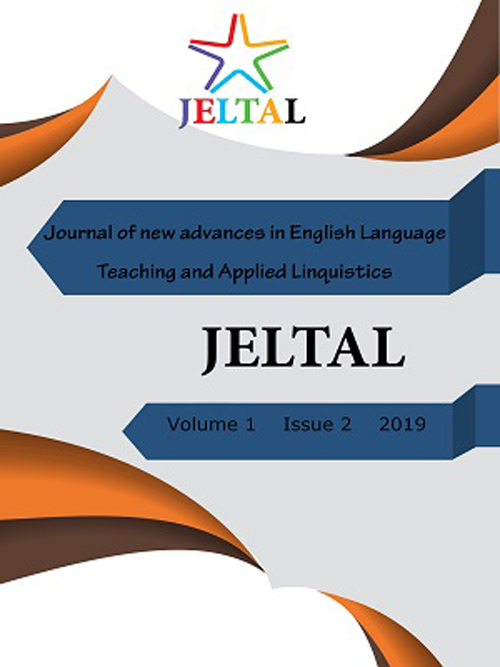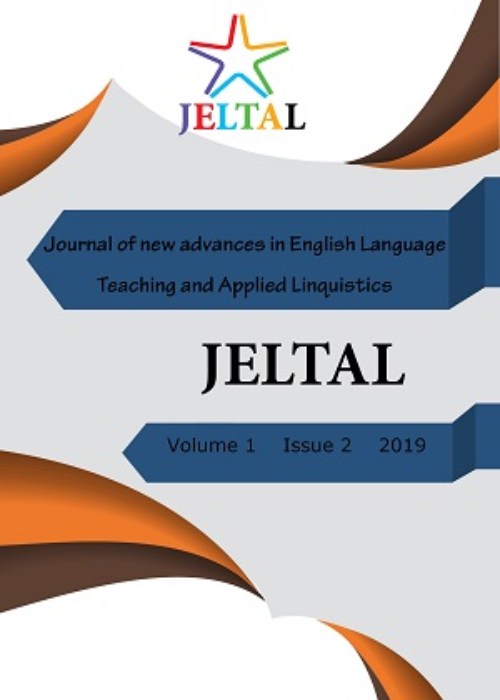فهرست مطالب

Journal of new advances in English Language Teaching and Applied Linguistics
Volume:3 Issue: 2, Summer and Autumn 2021
- تاریخ انتشار: 1400/09/14
- تعداد عناوین: 8
-
Pages 563-578The term corrective feedback is an imperative part of foreign language teaching and frequent practice in the field of learning and achievement. The present study aimed at investigating Iranian EFL teachers' and learners' cognition on corrective feedback on speaking skill covering the necessity, timing, agents of error correction, different types of feedback including recast, clarification request, elicitation, metalinguistic cue, direct correction, repetition, and the types of error that need to be corrected. The study was a quantitative, non-experimental descriptive design conducted at Iran-e-ma and Pendar Language Institutes in Isfahan, Iran during 2020. The participants were 25 non-native English-speaking female teachers and 60 EFL learners. The instruments of the study were questionnaires, semi-structured interviews, and observations. Descriptive and inferential statistics were used to analyze the data and come up with the findings of the study. In terms of feedback type, explicit and delayed corrective feedbacks were the most favoured error-correction forms and teacher-correction, serious and frequent errors were more preferred to be corrected by the teachers. Moreover, significant differences were observed between male and female learners regarding their cognition on feedback. This study could benefit learners, teacher educators, curriculum designers, and teachers in their reflective practice.Keywords: corrective feedback, Clarification request, Error correction, Learners’ cognition, recast, Teachers' cognition
-
Pages 579-591
This research was conducted to identify the personality types patterns of Bahasa Melayu teachers in secondary schools as well as analysing the relationship between teachers’ personality and teaching styles. 100 Bahasa Melayu teachers from around Malaysia were selected as respondents using purposive sampling method. This research employed a quantitative methodology. Research instruments used to collect data for this research were a set of questionnaires translated from The Big Five Inventory (BFI) by John in 1990 and Grasha Teaching Styles in 1996. Descriptive analysis which focusses on frequency and mean were selected. Inferential statistics which is Pearson correlation analysis was employed to analyse the relationship between teacher’s personality and teaching style. The finding shows that the most dominant teacher’s personality dimension s conscientiousness, followed by extraversion, openness, neuroticism, and the least personality among Bahasa Melayu teachers was agreeableness. Apart from that, Bahasa Melayu teachers in secondary schools are prone to practice expert teaching style followed by the formal authority style, facilitator style, personal model style, and the delegator style. The correlation test also showed that there was a significant relationship between teacher’s personality and teacher’s teaching style. In conclusion, personality affected teaching styles of Bahasa Melayu teachers in various secondary schools which in turns benefited the students.
Keywords: Personality, Teaching Styles, Bahasa Melayu Teacher -
Pages 592-609
Questioning as one of teaching and learning strategies has long been the focus of attention by researchers and scholars; one major reason is that asking proper questions leads to proper elicitation of knowledge. The present study is aimed at pursuing the implementation of questioning strategies proposed through Bloom’s (1956) taxonomy on enhancing the inferential reading comprehension ability of Iranian EFL learners. This study was quasi-experimental in Pretest/Posttest design, involving treatment and utilizing standardized tests. Qualitative and quantitative data collection methods were employed via the instruments of tests, and interview. From the subject pool of 186 intermediate-level English learners attending a university extra-curriculum program in a private institute in Tehran, Oxford Placement Test was administered and sixty intermediate EFL learners were selected and randomly assigned to treatment and control groups of thirty. The treatment group received questioning strategy-training explicitly in fifteen sessions of the reading comprehension course, while the control group followed common instruction in reading courses. This study was conducted during the first academic semester 2019-2020 and the result of interview and statistical analyses confirmed that questioning strategies enhanced the inferential reading comprehension ability of Iranian EFL learners. This study bears the implications of the findings for language learners/instructors, syllabus designers and materials developers.
Keywords: Questioning Strategies, Inferencing, Higher Order Thinking -
Pages 610-628
The present study was an attempt to investigate the effect of using digital audio files (e.g. podcasts) on EFL learners’ listening comprehension and then explored Iranian EFL learners’ attitudes toward the use of digital audio files in listening comprehension. To this end, 30 female language learners were selected among 60 learners who studied at Respina Talk center in Tehran through a homogeneity test. Then, the participants were randomly divided into two groups of experimental and control. After administrating the homogeneity test, all the participants were pre-tested to assess their listening comprehension at the beginning of the course, and then the treatment was practiced on the experimental group. The experimental group received the treatment on listening comprehension through using audio files (podcasts) while the control group was taught using traditional methods of teaching listening. The materials and time allocated to both groups were similar. After ten sessions of treatment, the groups were given a post-test. Finally, 24 items of survey questionnaire were administered to experimental group to gather students' perception toward the use of audio files in teaching listening. Independent and Paired Samples t-test showed that digital audio files had a significant impact on the listening comprehension of EFL learners, and that the learners who were exposed to such a treatment held significantly positive attitudes towards the use of the audio files. The results can have implications for EFL teachers to motivate learners to improve their listening ability by going for the audio files.
Keywords: CALL, EFL, Listening skill, MALL -
Pages 629-651The purpose of the current study was to find out the role of task types with different task complexity in complexity, accuracy, and fluency (CAF) of speaking performance in elementary, intermediate, and advanced EFL learners. In order to achieve the above-mentioned goal, 60 participants were randomly selected from 90 composing 21 elementary, 20 intermediate, and 19 advanced participants through Oxford Placement Test. The selected participants were asked to perform different task types (i.e. personal information exchange, narrative, and decision-making) and learners’ speaking CAF was measured and analyzed. These three tasks were chosen because they vary the importance of background knowledge and general familiarity. The sampled participants were asked to perform the prepared tasks in different task complexities (low, mid, and high) and their oral CAF was measured and analyzed. To measure CAF, percentage of error-free C-units for accuracy, clauses per C-units for grammatical complexity, type-token ratio (TTR) for lexical complexity, the number of tokens (words)/total task time (per minutes) for fluency were used. The results of mixed between-within subjects analysis of variance indicated that task types were significant factors on CAF. Furthermore, the results showed that proficiency level was statistically significant on CAF as well. The findings of this study provide pedagogical implications and recommendations for language teachers, material developers, and language assessors.Keywords: accuracy, Assessment, complexity, fluency, task types
-
Pages 652-668This study aims to find out the meaningful effect of employing cognitive strategies instead of traditional methods on reading and vocabulary as a change for today's educational system at high school. To inflame the interest of collaborating teachers who are not aware of differences between male and female ability and so as to fill the gap between vocabulary and reading comprehension, the current researcher set to examine the impact of employing cognitive strategies on reading and vocabulary learning achievement across gender. To do so, 64 male and female subjects from a total of 90 intermediate participants were homogenized through the Nelson proficiency test in four classes as 32 experimental and 32 control group. Then pretest and posttest were administered to both groups. The procedure lasted for 2 months and 16 sessions. The experimental groups received instruction as treatment regarding cognitive learning strategies (summarizing, note-taking, and re-reading) respectively, whereas the control groups received conventional instruction on the basis of their textbook. The results of the Wilcoxon run on the gained scores rejected the null hypotheses of the research saying that cognitive strategies have no effect on EFL learners' vocabulary and reading comprehension, as well as, showing no difference across gender. The study implies that the researchers find it helpful to see the bridging gap between vocabulary and reading comprehension by the cognitive strategies.Keywords: cognitive strategies, Gender, reading comprehension, Vocabulary
-
Pages 669-688Translation is a way of connecting two languages with different cultures. Fixed expressions are often challenging issues in the realm of translation. This article has investigated applied strategies and translatability of fixed expressions in The Blind Owl (Boof e koor). Therefore, two well-known English translations by Costello (1957) and Bashiri (2013) were examined. The data were analyzed to find applied strategies and investigate the translatability and untranslatability of fixed expressions. Two hundred ninety fixed expressions were collected of the corpus and its English translations. It was found that a few fixed expressions are untranslatable due to linguistic and cultural differences. Moreover, the author’s style in the book has impacted the translation. In addition, by the comparative study of the translators, it was found that the performance of Bashiri as a native translator is almost better than Costello as a non-native translator. Hence, the translator’s familiarity with language and culture of source language could be affected in translation.Keywords: Fixed expressions, Native translator, The Blind Owl, Translatability, Untranslatability
-
Pages 689-706There has been a renewed interest in studying how turn exchanges occur among interlocutors. While overlap and interruption do occur during conversation, such occurrence is considered problematic and a breach of turn exchange protocol. This study seeks to explore how some Malaysian undergraduate students use overlap, interruption and pauses in focus group discussion. There were four distinct groups – two each from the Faculty of Engineering and the Faculty of Modern Languages and Communication in a public university in Malaysia. The result shows that the subjects of this study more often use overlap to support a proposition by a previous speaker, and rarely interrupt a current speaker. In addition, the talks of most participants of this study are marked with several pauses, which render their speech to be delayed. The result suggests that acquisition of conversation practices at childhood tends to contribute to the manner of talk at adulthood. The knowledge of these speech mannerisms might help in reducing confrontations during conversation.Keywords: Overlap, interruption, pause, turn exchanges, Focus Group Discussion


